(February 3, 2025). It may be Black History Month. But in an era where cultural celebrations are vanishing from government websites, DEI programs are disappearing from corporate boardrooms, and America’s isolationism and international retreat are becoming more pronounced by the day, this year’s Grammy Awards felt like more than just a music industry gala — it was a statement. Even if its defiance wasn’t any greater than before, it certainly resonated more deeply last night (Sunday, Feb. 2) than in past years.
The annual gathering of the music industry’s biggest artists placed its recognition of the deadly Los Angeles area wildfires that destroyed thousands of homes and displaced people from all economic sectors last month front and center. Raising millions in donations and not missing a beat when it came to honoring first responders who risked their lives fighting the fires, the Grammys warded off any criticism it received for holding the event in L.A. just weeks after the fires devastated much of Southern California.
But it was the other elephant in the room that this year’s Grammys also tackled head-on: diversity. The night’s winners and their speeches made it clear that there would be no backing down in the battle for representation and ensuring that everyone has a seat at America’s expansive table.

Beyoncé’s country-leaning Cowboy Carter took home the night’s top prize — Album of the Year — notably her first such win after five nominations. More jarringly, she also took the top country honor, a stunning reversal after the album was shut out by the CMAs and effectively ignored by country radio last year upon its release.
Kendrick Lamar’s blistering Drake diss, “Not Like Us,” made him only the second rapper in history to win both Record and Song of the Year, after Childish Gambino (Donald Glover) won both awards in 2019 for his No. 1 protest song, “This Is America.” That Lamar, a Compton product known widely for his stinging takes on social issues, joined Glover in this distinction — and that both happened on Donald Trump’s presidential watches — was not lost on this blogger.
And Chappell Roan, a proudly queer singer, was named Best New Artist, further solidifying the Grammys’ role as a space for representation, even as those spaces — at the behest of today’s government — shrink elsewhere.

But beyond the awards, it was the speeches that cemented this night as an oasis in an anti-woke desert. Roan — journal in hand — spoke powerfully about queer identity in music as well as the industry’s unfair labor practices. Lady Gaga, in her acceptance speech for Best Duo with Bruno Mars (for “Die With a Smile”), gave a nod to trans people. Shakira shouted out her “immigrant brothers and sisters.” Alicia Keys, accepting the Dr. Dre Global Impact Award from Queen Latifah, delivered perhaps the most pointed line of the evening: “DEI is not a threat, it’s a gift.” She used her podium to call for greater recognition of women in music’s behind-the-scenes roles, an issue still largely overlooked in the industry. Stevie Wonder, seated at the piano beside Herbie Hancock during an all-star tribute to the late Quincy Jones, once again used his platform to champion peace and inclusion.
Even host Trevor Noah, the South African comedian born in Johannesburg, took digs at the current administration’s stance on immigration by quipping that this might be the last time he gets to host anything in the U.S.
The Grammys’ own past practices were also not immune to scrutiny. Academy CEO Harvey Mason addressed new initiatives to better support Black, female, LGBTQ, and other historically underrepresented artists after the Grammys were called out for snubbing The Weeknd’s all-time biggest Hot 100 hit, “Blinding Lights,” three years ago. He then introduced the Canadian superstar, who ended his years-long Grammy boycott with a rousing performance of his new song, Cry For Me.
With standout performances from Cynthia Erivo, Janelle Monáe, Shakira, Lainey Wilson, Lady Gaga, Billie Eilish, Doechii, and Roan, the night showcased a broad spectrum of women’s voices and identities. There was also no shortage of fellas: Teddy Swims, Shaboozey, and Benson Boone — owners of last year’s three biggest Hot 100 singles — all performed their instant classics. The Weeknd, Brad Paisley, Chris Martin (of Coldplay), Herbie Hancock and Stevie Wonder also dazzled. But Sunday was clearly “ladies night” at music’s top event.
Even more palpable was the show of unity on display from many rival artists. Competing nominees cheered wildly as their peers were announced as winners of the hotly contested trophies. Taylor Swift — true to her, umm, ‘reputation’ — danced in the aisles as fellow nominees performed their big hits. The former country star even presented the Best Country Album award to Beyoncé, an ironic and poignant exchange that found the two icons hugging in what was perhaps the most symbolic embrace of the night — one involving this century’s two biggest pop stars who both happen to be powerful women.
At a time when inclusivity is under attack more than ever, the Grammys seemed untouchable… practically doubling down on it. Because while music has always had the power to bring us together, it’s our differences (and the acceptance thereof) that make music and life so compelling, something it seems many folks will have to relearn in a few years.
DJRob
DJRob (he/him) is a freelance music blogger from the East Coast who covers R&B, hip-hop, disco, pop, rock and country genres – plus lots of music news and current stuff! You can follow him on Bluesky at @djrobblog.bsky.social, X (formerly Twitter) at @djrobblog, on Facebook or on Meta’s Threads.
You can also register for free (select the menu bars above) to receive notifications of future articles.


